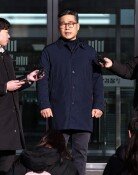Everland Bond Case Sparks Controversy
Everland Bond Case Sparks Controversy
Posted January. 23, 2007 07:05,
What happened at the final public trial for the appeal on the low-price issuance of convertible bonds by Samsung Everland last December 7?
Regarding the report by this newspaper that two to three pages of questions and answers from the judge and the prosecutor were not even spoken of during the public trial procedures (pages were added to the protocol for the final public trial by Criminal Case Division 5 of the Seoul High Court (Superintendent public judge Cho Hee Dae), the judiciary of appeal cases), the court and the prosecution are giving differing explanations.
Even though the procedures do contain some flaws, they were agreed upon by the interested parties, says the court. [We] obtained acknowledgements of the prosecution and the defendant, and there was no problem in the procedures for the alteration of the written arraignment.
On the other hand, the prosecution says, Ask the court why it was done that way.
What Happened on the Day of the Final Public Trial?-
During the final public trial of the Everland case, the judiciary said, Procedures are extremely important in court.
Superintendent Judge Cho said to the defendant, Though it would seem to be without doubt later on, there definitely is a difference between what was done in accordance with appropriate procedures and what was not.
Court personnel related to the case and the prosecution who attended the trial said, The trial did not seem to proceed smoothly.
The judiciary repeatedly asked the lawyer whether the latter agreed on including the facts handed in by the prosecutor to the written opinion.
It is very unusual for the judiciary to ask the defendants side, not the prosecutors, for an acknowledgement regarding the facts of the crime, says a person in the legal field. When the written arraignment is altered on the acknowledgement of the lawyer, the result can be that only the criminal facts favorable to the defendant can be included in the facts of the arraignment.
It is said that the defendant lawyer refuted this when first asked the question by the judiciary, but acknowledged it when the judiciary asked again.
However, a related person who was present at the trial said, The lawyer answered Pardon to the second question in a surprised manner, but the protocol for a public trial says he answered Yes as an acknowledgement.
In the last phase of the trial, the prosecutor asked for the right to speak in order to find out the intent of the judiciary concerning the alteration of the written arraignment.
But the judiciary refuted the request, saying, The judiciary will make the judgment.
Mercurial Explanations by the Judiciary-
It was pointed out that the varying comments of Judge Cho Hee-dae, who is the chief justice, are compounding the confusion.
On the afternoon of January 16, the date he decided to schedule the restart of the Everland case, he said to the journalists, I altered the written arraignment with the official authority of the court. He added, According to the code of legal procedure of a criminal case, the written arraignment can be altered by the official authority of the chief justice.
Clause 2, Article 298 of the code of legal procedure of a criminal case, however, only reads, The judge shall ask the prosecutor for an alteration of a written arraignment, which does not necessarily mean that the judge can, with his or her official authority, change the written arraignment without the request of a prosecutor.
When the prosecution confirmed the next day that it had never requested an alteration of the written arraignment, he said, In case [the prosecution] does not regard it as important
On January 22, he said, The prosecution did not turn in a request to alter the written arraignment. But I decided that it was necessary to elucidate the facts more clearly and made a supplement to the agreement from the perspective of both sides.
When someone says Ill add it in court, then it is usually accepted as meaning Ill supplement it, he said.
Superintendent Judge Chos comments on whether the prosecution was aware of the alteration of the facts of the arraignment do not compute, however.
On January 17, he said, The prosecution paid a visit after the final public trial was closed. Five days later, he answered the same question, saying, [I] talked with two prosecutors in charge in front of the office about the alteration of the facts of the arraignment. The prosecutors agreed and left. Why would they have visited my office if they had not known that the written arraignment was altered?
But it was revealed that the prosecutor went to the chief justices office right after the public trial but was unable to meet the chief justice.
The prosecutor only answered that he would be allowed to meet the chief justice the next day if he filled in the request form and turned it in, and he was unable to see the chief justice. It is said that the chief justice sent the words, The facts in the stenographic records will be kept as they are.
Unanswered Questions-
On January 22, Superintendent Judge Cho said, Why [are they] raising this matter now, even though they kept quiet about the alteration of the written arraignment on the day of the final public trial?
But it was disclosed that the prosecution viewed the protocol for a public trial on January 18, 40 days after the final public trial.
When some press members reported about the alteration of the written arraignment, we made a request to the judiciary for a look at the protocol for a public trial to find out the facts, says a prosecution official. The judiciary should have the relevant records.
The explanation by the judiciary regarding the questions and answers in the protocol for the public trial from the judiciary and the prosecutor are also dubious. They say, The records of a public trial are written by the secretariat. A secretariat does not simply type every word in a prepared paper read by the prosecution.
There shouldnt be any obscurity to one who understands the technical details of writing a protocol for a public trial, said Cho.
But a person in the legal field asked, Should the secretariat even be responsible for the alteration only because he or she writes the protocol for a public trial?







